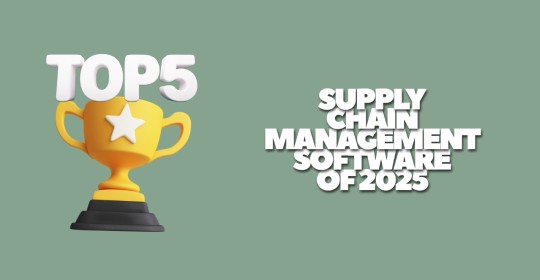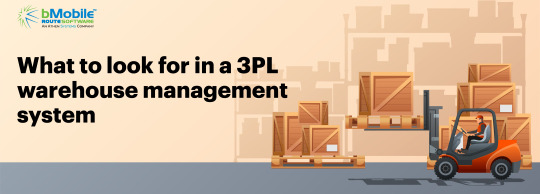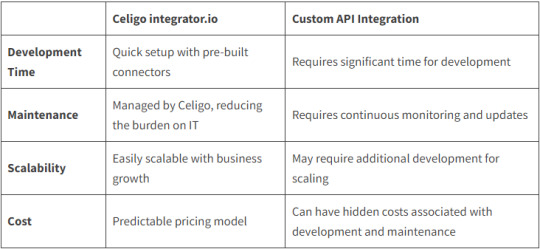#amazon netsuite integration
Explore tagged Tumblr posts
Text
Top 5 Supply Chain Management Software of 2025: Streamlining Business Operations

In the fast-paced world of business, efficient supply chain management is critical to success. As modern supply chains grow increasingly complex, businesses need powerful tools to streamline operations, reduce costs, and ensure smooth delivery. This is where Supply Chain Management (SCM) software comes in, offering businesses the ability to manage everything from procurement to delivery in a single platform.
Top SCM software options for 2025 include Coupa, Netstock, NetSuite, Zoho Inventory, and Infor.
Coupa stands out for its comprehensive cloud-native solutions that include procurement, inventory management, and supply chain design, powered by AI analytics and automation. It integrates easily with ERP systems like SAP and Oracle, though it may come with a learning curve.
Netstock is a go-to for small to mid-sized businesses, offering simplified inventory management and forecasting tools. It integrates well with ERPs like SAP and Microsoft Dynamics and excels in demand forecasting, though some users desire more advanced reporting features.
NetSuite, an Oracle product, is known for its robust capabilities in inventory and procurement management, especially for multinational businesses. It offers seamless integration with Oracle’s ecosystem but can be complex to set up.
Zoho Inventory is ideal for smaller businesses, particularly in e-commerce, due to its multi-channel order management and integration with platforms like Shopify and Amazon. It’s praised for ease of use, though some find it a bit pricey.
Infor offers a scalable solution with AI-driven supply chain optimization, real-time visibility, and predictive analytics, particularly beneficial for industries like manufacturing and healthcare. However, users have reported challenges with data accuracy and interface design.
Choosing the right SCM software is crucial for ensuring your supply chain runs efficiently and adapts to evolving business needs.
0 notes
Text
What to look for in a 3PL warehouse management system

When selecting a Third-Party Logistics (3PL) warehouse management system (WMS), there are several key factors and features to look for. Here’s a breakdown of important criteria:
1. Core WMS Features
Inventory Management: The ability to track inventory in real time, across multiple locations if needed. It should include features like cycle counting, lot/batch tracking, and expiry date tracking.
Order Management: Supports efficient order processing from multiple sales channels (e.g., e-commerce, retail, wholesale). It should automate order picking, packing, and shipping processes.
Receiving and Putaway: Streamlines the process of receiving goods, assigning storage locations, and managing inbound shipments.
Multi-Client Management: Since 3PLs often handle multiple clients, the system should allow for separate inventories, order tracking, and billing for different customers.
2. Integration Capabilities
ERP, eCommerce, and Marketplace Integration: The system should integrate seamlessly with major ERP systems, e-commerce platforms (e.g., Shopify, Magento), and online marketplaces (e.g., Amazon, eBay) for automated data exchange.
Transportation Management System (TMS) Integration: Having a system that integrates with a TMS is key for coordinating shipping, managing carriers, and optimizing routes.
Accounting Integration: To keep financial operations smooth, integration with accounting software (e.g., QuickBooks, NetSuite) is important.
3. Scalability
The WMS should be able to grow with your business and support expansion into new warehouses, clients, and geographic regions. Cloud-based systems are often more scalable and flexible.
4. Customization and Flexibility
Look for a WMS that allows customization to suit specific operational workflows, client requirements, or industry-specific needs. Flexibility is key for businesses with unique warehouse operations.
5. Advanced Picking and Packing Options
Multi-Order Picking: Capabilities for batch picking, wave picking, and zone picking.
Packing Optimization: Features that help determine the most efficient packing method for reducing shipping costs and space.
6. Automation and Efficiency Tools
RFID & Barcode Scanning: Support for RFID and barcode technology to improve speed and accuracy in inventory management and order fulfillment.
Automated Reporting: The ability to generate customized reports on key metrics like order accuracy, inventory levels, warehouse utilization, and client-specific KPIs.
Robotic Automation: Integration with robotics or automated picking systems if needed for larger or high-volume warehouses.
7. Client Portal
A portal for clients to log in, check their inventory, track shipments, view reports, and place orders. This enhances transparency and client satisfaction.
8. Analytics and Reporting
The system should provide real-time reporting and analytics on key warehouse performance metrics (e.g., order fulfillment rates, inventory accuracy, labor efficiency). These insights are valuable for decision-making and continuous improvement.
9. Labor Management
Tools for labor tracking, task assignments, and monitoring productivity. This is especially important in large-scale warehouses where staff efficiency can directly affect profitability.
10. Security and Compliance
Data Security: Ensure the WMS offers robust security measures such as encryption, user access control, and regular data backups.
Compliance: The system should help meet regulatory requirements, especially if you handle goods in industries like food, pharmaceuticals, or hazardous materials. It should offer features like tracking certifications and compliance reporting.
11. Mobile Accessibility
A mobile-friendly system allows warehouse staff to access key functions (inventory, picking, shipping) from handheld devices, tablets, or mobile scanners, improving flexibility and efficiency on the floor.
12. Cost and ROI
Consider the total cost of ownership, including upfront costs, subscription fees (if cloud-based), and any ongoing maintenance or support costs. It’s also essential to calculate the return on investment (ROI) in terms of labor savings, efficiency improvements, and better customer satisfaction.
13. Support and Training
Ensure the vendor offers comprehensive onboarding, training for warehouse staff, and ongoing customer support. Fast and effective support can reduce downtime in case of issues.
14. User-Friendly Interface
A WMS should be intuitive and easy for staff to use, minimizing the learning curve. Simple navigation and clear functionality can reduce errors and improve speed.
15. Billing and Invoicing Features
For 3PL providers, it’s essential to have automated billing and invoicing features that can account for storage, handling, and shipping charges per client, with support for different pricing models.
By carefully considering these factors, you’ll be better equipped to choose a 3PL WMS that aligns with your business's needs and enhances overall operational efficiency.
Our Software Applications:
Inventory Management Software | Truck Inventory Software | Multi Warehouse Management Software | Fleet Management Software
#bmobileroutesoftware#bmobile#inventorysoftware#inventorymanagementsystem#inventorymanagementsoftware#bmobile route software#inventory software#trending post#bmobileroute#united states
0 notes
Text
How to Use AI to Automate Inventory Management for E-Commerce Businesses.
Introduction
Inventory management is a critical factor in the success of any e-commerce business. Whether you're managing stock for a small boutique or a large-scale enterprise, staying on top of inventory levels can be a challenge. Issues like overstocking, understocking, and inaccurate forecasts can cause significant losses or missed opportunities.
This is where Artificial Intelligence (AI) comes into play. By using AI to automate inventory management, e-commerce businesses can drastically improve efficiency, reduce human errors, and increase profitability. In this blog, we’ll dive into how AI tools can help you streamline your inventory management process, optimize stock levels, and enhance your customer experience. Whether you're new to AI or already using it in other parts of your business, this guide will provide you with actionable insights to help you get started.
Main Content
1.Why Traditional Inventory Management Falls Short
- Human Error & Inefficiencies: Manual stock management relies heavily on human input, which can lead to errors like inaccurate stock counts, delayed reordering, and overstocking.
- Reactive vs. Proactive Management: Traditional inventory management is often reactive. Businesses only reorder stock after they run out or are dangerously low. This leads to stockouts and lost sales.
- Time-Consuming: Manual processes, even with spreadsheets, take up time that could be used in growth-related activities like marketing and customer acquisition.
2.How AI is Revolutionizing Inventory Management
- AI-Powered Forecasting: AI uses historical sales data, seasonal trends, and external factors (like holidays, weather conditions, or economic conditions) to predict demand more accurately.
- Example: AI algorithms analyze previous buying patterns during holiday seasons and adjust stock levels accordingly, ensuring products don’t run out during peak demand.
- Automated Stock Replenishment: AI can automatically reorder items based on preset thresholds. It can also consider factors like supplier lead times and storage capacity.
- Dynamic Pricing: AI can suggest price adjustments based on stock levels and customer demand, helping maximize profit margins.
3.Key Benefits of Using AI for Inventory Management

- Optimized Warehousing: AI algorithms can optimize where items are stored within your warehouse for quicker order fulfillment.
- Improved Cash Flow: When you have the right amount of stock, neither too much nor too little, you can better allocate cash for other business needs.
- Scalability: As your e-commerce business grows, manual inventory management becomes overwhelming. AI systems can easily scale alongside your growth without added labor costs.
4.AI Tools for E-Commerce Inventory Automation
- Zoho Inventory: This AI-driven platform automates stock tracking, order management, and even integrates with e-commerce platforms like Shopify or Amazon.
- QuickBooks Commerce: AI features in QuickBooks Commerce allow businesses to automate reordering and track stock movements in real-time.
-Skubana: Skubana’s AI algorithms analyze historical sales data, forecast future demand, and optimize fulfillment operations for e-commerce businesses.
- NetSuite: NetSuite offers a cloud-based ERP solution that incorporates AI for advanced inventory management, demand planning, and supply chain automation.
5.Step-by-Step Guide to Implementing AI for Inventory Management.
-Step 1: Evaluate Your Current Inventory Process: Analyze your existing system and identify gaps that AI can fill, such as data entry errors or slow reordering.
- Step 2: Select an AI-Powered Inventory Management Tool: Research and choose a platform that integrates seamlessly with your e-commerce platform and can scale with your business.
- Step 3: Train Your AI System with Historical Data: The more historical sales and stock data you feed the AI, the better its predictions and recommendations will be.
- Step 4: Automate Reordering: Set up automatic reordering for critical products based on the AI’s predictive analysis.
- Step 5: Monitor and Optimize: Continuously monitor the AI system’s performance and fine-tune it as your business grows.
6. Common Challenges and How to Overcome Them
- Data Quality: Poor-quality data can lead to inaccurate predictions. Ensure your historical data is clean and comprehensive.
- Initial Setup Costs: While AI tools require an upfront investment, the long-term savings on stock management errors and improved efficiency will outweigh the costs.
- Staff Training: Train your staff to use the AI tools effectively to ensure a smooth transition from manual to automated inventory management.
7.Real-Life Case Study: AI Inventory Management in Action
- Example: Shopify Store Using AI for Stock Management**: Discuss how a Shopify-based store selling electronics used AI to reduce stockouts by 30% during holiday seasons, improved forecasting accuracy by 15%, and achieved a more streamlined reorder process.
Conclusion & Call to Action
AI offers unparalleled benefits in streamlining inventory management for e-commerce businesses. By automating stock forecasting, reordering, and even warehousing, AI allows business owners to focus on growing their brands instead of getting bogged down by manual processes. Whether you’re a small business owner or running a large-scale e-commerce platform, the integration of AI in your inventory management system can boost your bottom line and enhance operational efficiency.
If you’re ready to explore how AI can revolutionize your e-commerce operations, contact us today for a free AI audit. Our team of experts will assess your inventory management system and recommend tailored AI solutions that fit your business’s unique needs. Let’s take your e-commerce business to the next level with AI-driven automation.
Contact us for a Free Audit
0 notes
Text
WebBee is a top provider of E-commerce Integration Solutions for multiple sales channels, marketplaces and ERPs. It helps eCommerce Businesses by reducing their mannual workload and focus on scaling their business.

1 note
·
View note
Text
Comprehensive Guide to ERP Software for Retail Industry

Retail ERP vs. Traditional ERP
A erp software for retail industry system is catered to the special processes of multi-channel or omnichannel retailers. On the other hand, a traditional best erp software for retail is outfitted for general business requirements in different industries, e.g. manufacturing or construction. In retail ERP software, the center modules developed are around the workflow of the retail industry.
Some erp software for retail, for example, Brightpearl, can be designed such that they are retail ERPs. When you are looking for a retail version of classic ERP, you are spoilt for choice. Examples of ERP and accounting systems are Acumatica, NetSuite, Microsoft Dynamics 365, SAP Business One, and QuickBooks POS, to name just a few, whose frontend can be integrated with QuickBooks Desktop accounting software.
It pays to buy Quickbooks products and services from a value-added reseller that possess the experience in POS and the level of retail expertise to ensure your QuickBooks retail solution is fine-tuned.
It is possible to fit into a retail and traditional ERPs with an add-on software that serves with purpose specifically for retailers. For Example, AP automation or global mass payments software, for retailers ; Tipalti .Software has enabled companies like Touch of Modern to effectively handle accounts payable and large payment workflows with a small team.
Retail ERP Benefits
The ten good things in a retail ERP are:
Real-time visibility reporting and payment processing
An integrated omnichannel system across the front and back ends
Centralized customer database
eCommerce and physical store integration with an automated POS
Demand forecasting capability
Intelligent procurement, replenishment, and supply chain management
Real-time inventory management
Dynamic pricing capability
Automation in processes for efficient cost savings
Data analytics to support data-driven decision making.
Retail ERP is a real-time, specially customized software system connecting and integrating business processes involved in retail operations. A retail ERP enables retailers to better streamline, automate, and manage front-end and back-office business processes. This is software specially customized for ERP that's designed to help retailers improve their bottom line.
Multichannel commerce involves driving sales through physical retail stores (brick-and-mortar), e-commerce, call centers, and other online sales channels. They may access one or more warehouses and rely on inventory management to fulfill the orders and manage returns.
Automate and Extend Your Retail ERP
Tipalti powers efficiency and enhanced functionality in accounts payable. For businesses, our touchless invoice processing solutions reduce your business expenses.
Best Retail ERP Software Solutions
The erp software for retail business are either specifically designed for the retail sector or part of the traditional ERP systems, add-on third-party integrations poised at elevating the ERP for retail operations.
ERP Systems That Can House Retail-Specific Needs
Some best available ERP systems for retailers include:
Brightpearl
Brightpearl – A review
Brightpearl is an omnichannel retail ERP software solution designed for retailers and wholesalers.
The company bills its software as a Digital Operations Platform that can process thousands of orders daily. Brightpearl is purpose-built retail ERP. It offers eCommerce integrations with BigCommerce, Magento, Shopify, Amazon, eBay, and even Walmart these are erp software for retail shop.
Stated differently, Brightpearl, the retail version of Sage, allows for:
Real-time data
Sales order management
Inventory management and demand planning
Shipping and fulfillment
Warehouse management
Retail accounting
Purchasing and supplier management
Workflow automation
Reporting and business intelligence
Built-in, pre-integrated third-party app solutions for new channels and functional tools
SAP Business One
SAP Business One is ERP software that functions in the cloud for small and mid-sized businesses. By augmenting the following functionality to the ERP software, retailers using SAP Business One get support for:
eCommerce and omnichannel
Back office, online, and in-store operations
Point of sale and payment processing
In-store and inventory management
Analytics and reporting
Acumatica Retail-Commerce Edition
Acumatica
This is Acumatica's retail and eCommerce ERP solution. It is a multi-channel, cloud-based software, and it is best branded as the 'Retail-Commerce Edition' by small and middle-market businesses. Acumatica offers 24/7 customer service as a core feature in ERP.
It has other features such as:
Financial management
CRM
Warehouse management
Sales Order Management
Customer Self-Service Portal
Reporting and data analysis tools
Inventory management
Purchase
0 notes
Text
NetSuite Ecommerce Integration: Best Practices and Benefits
NetSuite E-commerce syncing lets companies link their webshop with their ERP tool. It's like a one-stop shop for handling orders, stock, clients, and much more. Getting this sync right is key for a smooth and effective online selling experience.

Best Practices:
Know Your Goals: Be clear on the purpose and needs of your integration.
Pick The Best Method: Choose from ready-made integrations, APIs, or tailor-made development.
Align Data Fields: Check for correct data matching between e-commerce and ERP systems.
Check Well: Do thorough checks to make sure of data is truthful and the system working.
Watch and Improve: Always check and adjust the integration for better performance and correctness.
Benefits:
Better Order Handling: Orders are processed and fulfilled automatically.
Precise Stock Management: Inventory updates and syncs in real-time.
Improved Customer Interactions: Customer data is unified and personal.
Heightened Efficiency: Manual errors decrease while productivity increases.
Informed by Data: Detailed analytics and reports guide decision-making.
Flexible and Scalable: Adjusts to the needs of growing businesses.
Savings: Costs drop thanks to minimized manual work and fewer errors.
Common Integrations:
Payment Portals: Safe handling of payments and transactions.
Delivery Services: Simplified shipping and arrangements for delivery.
Selling Platforms: Effortless connection with Amazon, eBay, etc.
Customer Relationship Management: Unified customer info boosting sales and marketing.
Enterprise Resource Planning: Managed financial operations, stock control, and order organization.
Conclusion:
NetSuite E-commerce ties have loads of perks for companies. These range from smoother processes to better customer relations. If businesses stick to effective strategies and pick the suitable integration method, they can really get a lot out of their e-commerce platform and then make their business grow.
#erp software#corporate performance management#customer relationship management#Netsuite Ecommerce#IBM Cloud
0 notes
Text
Expanding Your Horizons with Delivery Services

Companies continually seek ways to build customer relationships that go beyond the product itself, fostering loyalty. One method gaining popularity is offering delivery routing software to customers. With social distancing and stricter in-store regulations, providing delivery services has become essential for business viability. The New York Times reported a nearly 40% increase in online consumer spending at the pandemic's peak, while in-person shopping had already declined as younger consumers favored online options.
Delivery costs can be substantial, comprising up to 30% of the total meal cost (TMC), and food deliveries can reach as high as 45%. These costs are challenging to hide within product prices and are often waived as a competitive advantage. Traditionally, companies relied on third-party delivery services, but many, like Amazon, are now developing their own. The explosive growth of digitally-enabled delivery services underscores the value customers place on convenience and variety. McKinsey projects the digital food delivery market will reach $22 billion by 2025, prompting many companies to internalize their delivery services to tap into this revenue.
Well-managed delivery services can enhance customer loyalty, reduce emergency response costs, maintain control over customer data, and streamline the delivery process. They can also be a revenue source and boost margins if effectively managed. Conversely, poorly managed services can be costly.
To plan and execute deliveries effectively, companies are adopting delivery management solutions to streamline their services. Organizing routes and building efficient delivery plans are crucial for lowering operational costs.
NetScore’s Delivery Routing application, built on the NetSuite ERP system, offers a comprehensive planning solution for dispatch route organization. It includes a mobile application providing drivers with necessary delivery tools.
Effective organization is key to successful delivery operations. As sales orders are processed in NetSuite Delivery Routing system generates delivery orders, using geo-point mapping to create stops. A rule-based system controls route building, managing order numbers, truck capacity, and transit times. Dispatch route planner can be adjusted according to preferences and assigned to drivers.
Fleet vehicle tracking ensures drivers follow the most efficient routes and stay on schedule. NetScore allows planners to view graphical route representations and receive real-time updates. A map view shows driver locations, enabling route adjustments as needed. Delivery orders can be reassigned if a vehicle breaks down or additional help is required.
Simplifying drivers' tasks is crucial for cost-effective route planning software. Effective route plans ensure proper truck loading in reverse stop order. NetScore’s solution provides route plans usable as picking or loading documents to position orders correctly for truck management system.
Executing the route plan is vital for timely, cost-effective deliveries. Mobile applications equip drivers with powerful tools for delivery execution. NetScore’s Delivery Routing solution offers:
- Graphical route depictions
- Travel time between stops
- Turn-by-turn instructions
- Order contents
- Customer delivery alerts
- Reasons for delivery cancellations
Proof of delivery is crucial, capturing signatures, photographing product drops, and noting key delivery information. NetScore’s mobile app facilitates quick data collection, automatically uploading it to the backend system and attaching it to the delivery record. Integration with Google Drive helps store pictures and signatures, minimizing NetSuite data storage.
Expanding delivery operations can optimize company benefits. Functions like picking up returns, accepting payments, and collecting products based on purchase orders during delivery routes are advantageous. NetScore’s Delivery Routing application integrates these features into your NetSuite system and mobile application.
For assistance in planning and implementing your delivery service, please contact a NetScore Account Executive.
#fleet vehicle tracking#dispatch route planner#route planning software#delivery routing software#netsuite delivery routing#truck management system
0 notes
Text
Dell Boomi AWS

Dell Boomi and AWS: A Match Made in Cloud Integration Heaven
In today’s rapidly evolving digital world, businesses constantly seek ways to streamline operations, improve efficiency, and unlock data-driven insights. This is where the powerful combination of Dell Boomi and Amazon Web Services (AWS) shines, transforming the way organizations unlock the true potential of their data and applications.
What is Dell Boomi?
Dell Boomi is a leading cloud-based integration platform and service (iPaaS). Consider it the digital glue connecting various applications, data sources, and systems—whether in the cloud or on-premises. Boomi’s intuitive, low-code interface simplifies the creation of complex integration flows, empowering enterprises to unlock data silos and automate business processes.
Why Partner Boomi with AWS?
AWS provides vast cloud computing services, offering unparalleled scalability, reliability, and global reach. When you integrate Boomi with AWS, you gain access to:
Comprehensive Cloud Services: Effortlessly connect your Boomi integrations with services like Amazon S3 (storage), Amazon EC2 (compute), Amazon RDS (databases), and many more.
Robust Data Management: Facilitate secure and efficient data movement between AWS services and other endpoints, enabling seamless data pipelines and analytics.
Scalability: Boomi’s cloud-native architecture and AWS’s elasticity allow your integrations to scale effortlessly to meet changing business demands.
Global Availability: AWS’s global footprint ensures that your Boomi integrations can support data flows and business processes worldwide.
Critical Use Cases for Dell Boomi and AWS
Hybrid Cloud Integration: This service bridges the gap between your on-premises systems and AWS cloud services, facilitating smooth data migration and seamless business processes across hybrid environments.
SaaS Application Integration: Effortlessly connect popular SaaS applications like Salesforce, NetSuite, Workday, and others to your AWS ecosystem, streamlining data flows and unlocking valuable business insights.
IoT Data Orchestration: Manage data flow from IoT devices into AWS services, enabling real-time insights, predictive analytics, and enhanced operational efficiency and decision-making.
Modern Data Warehousing: Simplify data extraction, transformation, and loading (ETL) processes into AWS Redshift or other data warehouse solutions for in-depth business intelligence.
API Development and Management: Build and expose Boomi APIs to streamline interactions between AWS services, external systems, and partner ecosystems.
Getting Started with Boomi on AWS
Dell Boomi provides multiple options for leveraging their iPaaS on AWS:
Boomi Marketplace: Discover pre-built integrations and connectors on the AWS Marketplace that accelerate your integration projects.
Boomi Molecule: A lightweight runtime engine from Boomi that can be deployed on AWS for scalable and fault-tolerant integration processes.
Boomi Pay-As-You-Go: Explore Boomi’s capabilities with a flexible consumption model, which is ideal for starting small with your integration needs.
The Future is Integrated
The partnership between Dell Boomi and AWS empowers businesses to break down data silos, automate workflows, and drive innovation through seamless cloud integration. As organizations continue their cloud journeys, Boomi and AWS will play an increasingly critical role in shaping the future of connected, data-driven enterprises.
youtube
You can find more information about Dell Boomi in this Dell Boomi Link
Conclusion:
Unogeeks is the No.1 IT Training Institute for Dell Boomi Training. Anyone Disagree? Please drop in a comment
You can check out our other latest blogs on Dell Boomi here – Dell Boomi Blogs
You can check out our Best In Class Dell Boomi Details here – Dell Boomi Training
Follow & Connect with us:
———————————-
For Training inquiries:
Call/Whatsapp: +91 73960 33555
Mail us at: [email protected]
Our Website ➜ https://unogeeks.com
Follow us:
Instagram: https://www.instagram.com/unogeeks
Facebook: https://www.facebook.com/UnogeeksSoftwareTrainingInstitute
Twitter: https://twitter.com/unogeek
0 notes
Text
Why Choose Celigo Integrator.Io Over Building Custom API Integration?
In the world of data integration, the debate between using a platform like Celigo integrator.io vs building a custom API integration is a hot topic. This article aims to shed light on why Celigo might be a better choice for your business.

What Is Celigo Integrator.Io?
Celigo integrator.io is a leading iPaaS (Integration Platform as a Service) platform that allows businesses to connect their applications and automate business processes. With its robust iPaaS platform, businesses can seamlessly connect their systems such as Oracle NetSuite, Salesforce, Amazon, Shopify, BigCommerce, 3PL Systems and similar other applications.
Celigo Integrator.Io Vs Custom API Integration

Key Advantages Of Celigo Integrator.Io
Pre-built Connectors: Celigo offers pre-built connectors for integration use cases like Oracle NetSuite ERP integration with Shopify, Amazon, BigCommerce, Salesforce, Magento 2, etc., which significantly reduces the time and effort required to set up integrations.
Scalability: As your business grows, so does your data. Celigo, integrator.io ensuring your integrations can handle increased data volume.
Reduced IT Burden: With Celigo integrator.io, the burden on IT teams is significantly reduced as the platform manages the integrations, freeing up resources for other tasks.
Cost-Effective: Unlike Custom API Integrations, which can have hidden costs associated with development and maintenance, Celigo offers a predictable pricing model.
In conclusion, Custom API integration development offers flexibility, however on the other side, the quick setup, scalability, reduced IT burden, and cost-effectiveness of Celigo make it a compelling choice for businesses looking to streamline their processes with efficient integrations. The Celigo integrator.io is a testament to the platform’s capabilities and effectiveness.
Integs Cloud: Your Trusted Celigo Integration Partner
Integs Cloud is a certified Celigo partner that provides end-to-end integration services, from consulting and implementation to support and maintenance. With a team of experienced and certified Celigo experts, Integs Cloud can handle any integration challenge and deliver solutions that meet your business needs and goals.Whether you need to integrate Oracle NetSuite with Shopify, Amazon, BigCommerce, Salesforce, Magento 2 or any other applications, Integs Cloud can help you achieve it with the Celigo iPaaS platform. Contact Integs Cloud today and get a free consultation and quote for your integration project.
#IntegsCloud#DataIntegration#DataAutomation#Celigo#CeligoVsCustomAPI#IntegrationSolutions#APIIntegration#DataFlow#iPaaS#Integration#Automation#API#SaaS#Enterprise#Tech#Technology#ERP#Software
0 notes
Text
Maximizing Capabilities: Shopify Third-party App Integration Services
In this informative blog, we have discussed the benefits of integrating Shopify stores with third-party apps. Along with that, we have also discussed the top useful Shopify third-party integration for Shopify store owners. The top integrations are as follows:
Shopify NetSuite integration
Shopify Amazon integration
Shopify EDI integration
Shopify tally ERP integration To gather in-depth knowledge on this topic, read our informative blog today!
0 notes
Text
Unlocking Business Potential with Cloud Management Services and Leading Platforms
Unlocking Business Potential with Cloud Management Services and Leading Platforms
In today's rapidly evolving digital landscape, leveraging advanced cloud management services and platforms has become imperative for businesses seeking scalability, flexibility, and efficiency. Let's explore how prominent services from industry leaders empower organizations to thrive in the cloud era.
1. Amazon Web Services (AWS): Driving Innovation
Amazon Web Services (AWS) stands at the forefront of cloud computing, offering a comprehensive suite of services that cater to diverse business needs. From scalable computing power with Amazon EC2 to secure storage solutions with Amazon S3, AWS provides the foundation for innovation and growth.
2. Amazon Connect: Elevating Customer Engagement
Deliver exceptional customer experiences with Amazon Connect, a cloud-based contact center service. Seamlessly integrate customer interactions across various channels, enhancing communication and satisfaction.
3. Microsoft Azure: The Azure Advantage
Microsoft Azure services offers a robust cloud platform, empowering businesses with a wide range of services, including virtual machines, databases, and AI capabilities. Explore how Azure accelerates digital transformation.
4. NetSuite: Unifying Business Operations
NetSuite Services is a cloud-based suite of business management applications, enabling organizations to streamline processes across finance, HR, and more. Learn how NetSuite transforms business operations.
5. ServiceNow: Revolutionizing Service Management
ServiceNow Services is a leading platform for IT service management, offering a unified approach to service delivery. Discover how ServiceNow transforms service management and accelerates digital workflows.
6. OutSystems: Agile Application Development
OutSystems Services provides low-code development tools, empowering organizations to rapidly build and deploy applications. Explore the possibilities of agile application development with OutSystems.
7. BigCommerce: E-Commerce Excellence
For e-commerce businesses, BigCommerce is a game-changer. It offers a robust platform for building and growing online stores. Dive into the world of e-commerce with BigCommerce development services.
8. Magento: Crafting E-Commerce Success
Magento is a powerful e-commerce platform known for its flexibility and scalability. Explore how Magento development services can elevate your online store.
9. Oracle: Empowering Enterprise Solutions
Oracle provides a comprehensive suite of cloud services for enterprises, spanning databases, applications, and infrastructure. Explore how Oracle services drive innovation and efficiency.
10. WooCommerce: Tailored for WordPress
WooCommerce is a WordPress plugin that transforms websites into powerful e-commerce stores. Unleash the potential of WooCommerce web agency services.
Conclusion: Transforming Possibilities into Realities
The dynamic landscape of cloud management services offers businesses unparalleled opportunities for growth and efficiency. By harnessing the capabilities of leading platforms, organizations can navigate the digital landscape with confidence and drive success.
0 notes
Text
Comprehensive Service Portfolio: Your Key to Digital Success-
When it comes to powering your business in the digital age, you need a partner who can provide a comprehensive array of services tailored to your specific needs. Our extensive service portfolio covers a wide range of solutions, ensuring that you have the tools and support necessary to thrive in today's competitive landscape.
1.Amazon Connect Services: Enhance your customer engagement with Amazon Connect Services, a cloud-based contact center service. It enables you to deliver personalized and efficient support experiences, connecting your customers to the right resources with ease.
2.Amazon Web Services (AWS): Amazon Web Services is the gold standard for cloud computing, offering a wide variety of scalable, reliable, and flexible cloud solutions. Whether you require infrastructure, storage, databases, or artificial intelligence, AWS has it all.
3.Cloud Management Services: Efficiently manage and optimize your cloud infrastructure and resources with ours Cloud Management Services. We ensure that your cloud environment operates at peak performance while keeping costs in check.
4.Digital Commerce Agency: Elevate your online business with the expertise of ours Digital Commerce Agency. From website development and design to digital marketing and e-commerce strategy, we help you maximize your online presence and revenue.
5.SAP Services SAP services are designed to drive innovation and efficiency in your business operations. Our team specializes in SAP solutions, providing you with the tools and guidance to transform your industry-specific processes.
6.Content Management Service: Effortlessly manage your digital content with ours Content Management Service. We offer comprehensive solutions to help you create, organize, and deliver compelling content, ensuring a seamless user experience.
7.Microsoft Azure Services: Microsoft Azure Service provides a suite of cloud services to empower your business. From application development to AI and machine learning, Azure is your key to modernizing and scaling your operations.
8.NetSuite Service: Streamline your business operations with NetSuite Service, a cloud-based, integrated business management software suite. It covers ERP, CRM, e-commerce, and more, helping you optimize your processes.
9.ServiceNow Services: Revolutionize your service management and workflow automation with ServiceNow. We offer expertise in implementing, customizing, and maintaining ServiceNow Service to enhance your business's efficiency.
10.Out Systems Services: Discover the advantages of rapid application development with Out Systems Service' low-code platform. Our services help you create and deploy applications quickly, empowering your business with digital innovation.
11.BigCommerce Development Services: Enhance your online store with our expert BigCommerce Development Services. We specialize in creating high-performance, user-friendly e-commerce solutions tailored to your business needs.
11.Magento Development Services: Elevate your e-commerce experience with ours Magento development Services. From custom themes and extensions to advanced integrations, we bring your online store to the next level.
12.Shopify Services: Build a thriving online presence with Shopify's e-commerce platform. Our Shopify Services cover everything from store setup to design, app integrations, and digital marketing to help you succeed in the competitive e-commerce landscape.
13.Oracle Services: Leverage the power of Oracle's comprehensive suite of Oracle services, designed to meet the demands of large enterprises. Our experts can help you implement and optimize Oracle solutions for your specific industry.
14.WooCommerce Web Agency: Maximize the potential of your WooCommerce store with our WooCommerce Web Agency services. We offer design, development, optimization, and ongoing support to ensure your online business flourishes.
Explore the endless possibilities, optimize your services, and stay ahead of the competition with a partner who understands your unique business needs. Contact us today to discover how we can assist you in achieving your business goals and thriving in the digital world.
1 note
·
View note
Text
What is the best solution for multi-channel selling?
The best solution for multi-channel selling depends on various factors such as the size of your business, your specific needs, and your budget. However, there are a few popular and effective solutions that businesses often consider for multi-channel selling. Here are some options: E-commerce Platforms with Built-in Multi-channel Support: Platforms like Shopify, BigCommerce, and WooCommerce offer built-in multi-channel support, allowing you to manage multiple sales channels from a single dashboard. They provide integrations with popular marketplaces like Amazon, eBay, and social media platforms, enabling you to sell across multiple channels seamlessly. Multi-channel Management Software: Dedicated multi-channel management software like ChannelAdvisor, SellerCloud, Manage your ecommerce and Linnworks provides robust features for inventory management, order fulfilment, and listing synchronization across multiple channels. These tools often offer automation capabilities, analytics, and reporting to streamline your operations. MYE is the best Linnworks alternative for multichannel management. Enterprise Resource Planning (ERP) Systems: If you operate a larger business with complex operations, an ERP system like NetSuite or Microsoft Dynamics 365 can handle multi-channel selling alongside other core business processes. ERP systems offer centralized management of inventory, orders, customer data, and financials across different sales channels. Application Programming Interfaces (APIs) and Custom Integrations: For businesses with unique requirements, building custom integrations using APIs can be a viable solution. By leveraging APIs provided by e-commerce platforms, marketplaces, and third-party services, you can create tailored solutions that connect your different sales channels and streamline operations. It's important to evaluate these options based on your specific needs, scalability, ease of use, available features, and integration capabilities. Consider factors such as pricing, customer support, and the scalability of the solution as your business grows.

#order management software#automatedinventorymanagement#inventory management#ordermanagementsoftware#ecommerce order management software#inventory management system
0 notes
Text
NetSuite Amazon Integration Connector | NetScore
NetScore Amazon Connector that seamlessly integrates the Amazon Marketplace with NetSuite. It Comes with Prebuilt integration various channels with NetSuite.
#amazonconnectorfornetsuite#amazonnetsuiteintegration#amazonnetsuiteconnector#netsuiteamazon#AmazonIntegrationApp
0 notes
Text
Boomi Enterprise Connectors

Boomi Enterprise Connectors: Streamlining Your Integrations
Boomi, a leading cloud-based integration platform (iPaaS), offers a robust set of enterprise connectors that empower businesses to connect various applications and data sources seamlessly. This blog post dives into the world of Boomi connectors, exploring their capabilities and the value they bring to organizations.
What are Boomi Enterprise Connectors?
Boomi connectors act as bridges, enabling bi-directional communication between your existing applications, databases, and cloud services. Boomi boasts a vast library of pre-built connectors encompassing a wide range of categories, including:
Enterprise Resource Planning (ERP): Connect to popular ERP systems like SAP, Oracle NetSuite, and Microsoft Dynamics.
Customer Relationship Management (CRM): Integrate seamlessly with Salesforce, HubSpot, and other CRM platforms.
Databases: Access and manipulate data from diverse databases like Oracle, SQL Server, and MySQL.
E-commerce: Integrate your online store with platforms like Magento and Shopify.
Cloud Storage: Connect to cloud storage services like Dropbox, Google Drive, and Amazon S3.
Many More: The Boomi connector library covers many applications and services.
Benefits of Boomi Enterprise Connectors
Simplified Integrations: Boomi’s drag-and-drop interface and pre-built connectors eliminate the need for complex coding, streamlining the integration process.
Reduced Costs: Boomi connectors minimize manual effort and associated costs by automating data exchange between applications.
Improved Efficiency: Streamlined integrations lead to faster data exchange and enhanced operational efficiency across your organization.
Enhanced Visibility: Boomi connectors provide a centralized platform for managing all your integrations, offering greater visibility and control.
Faster Time to Market: With simplified integrations, businesses can quickly launch new applications and services.
Beyond Pre-Built Connectors
Boomi doesn’t limit you to pre-built connectors. Their open architecture allows for custom connector development, enabling you to integrate with even the most niche applications.
Conclusion
Boomi Enterprise Connectors are a powerful tool for businesses seeking to streamline data exchange and unlock the full potential of their application ecosystem. By leveraging Boomi’s extensive connector library and intuitive development tools, companies can achieve seamless integration, improve operational efficiency, and gain a competitive edge.
youtube
You can find more information about Dell Boomi in this Dell Boomi Link
Conclusion:
Unogeeks is the No.1 IT Training Institute for Dell Boomi Training. Anyone Disagree? Please drop in a comment
You can check out our other latest blogs on Dell Boomi here – Dell Boomi Blogs
You can check out our Best In Class Dell Boomi Details here – Dell Boomi Training
Follow & Connect with us:
———————————-
For Training inquiries:
Call/Whatsapp: +91 73960 33555
Mail us at: [email protected]
Our Website ➜ https://unogeeks.com
Follow us:
Instagram: https://www.instagram.com/unogeeks
Facebook: https://www.facebook.com/UnogeeksSoftwareTrainingInstitute
Twitter: https://twitter.com/unogeek
0 notes